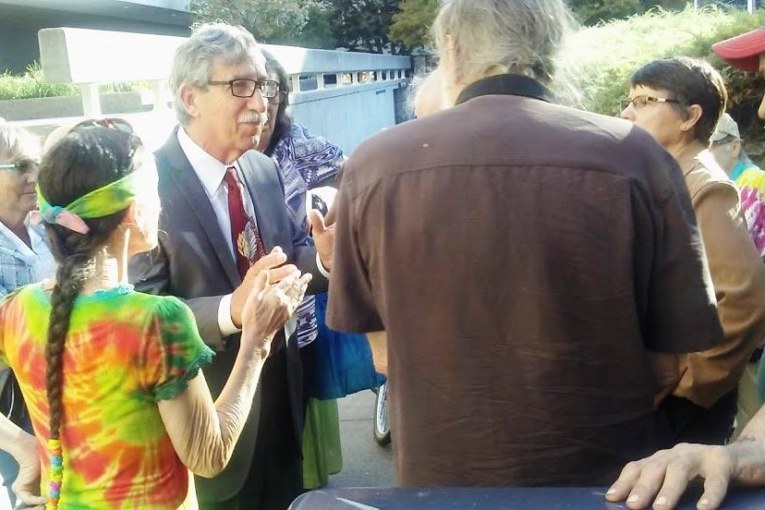

By Cres Vellucci
It wasn’t a classic, like “Tale of Two Cities,” but opening arguments to the jury Wednesday in what is expected to be a riveting two-week Sacramento Superior Court civil trial pitting Sacramento’s homeless against the City of Sacramento certainly were two different tales.
Homeless plaintiffs originally sued the City in 2009 to challenge the constitutionality of the City’s 22-year-old anti-camping ordinance. The suit initially failed, but part of it – whether the ordinance is being unconstitutionally applied – is now the focus on the trial.
Plaintiffs, in pleadings, claim the ordinance “is and has been selectively enforced against homeless people in violation of the Fourteenth Amendment to the United States Constitution and Article I, Section 7(a) of the California Constitution,” and are asking for declaratory relief to end the practice.
The city ordinance makes it illegal for anyone to camp outside anytime on public property, and allows camping for only 24 hours on private property and only with the permission of the property owner. That may come to as a surprise to families who pitch tents in their backyards.
The suit asserts that the City’s enforcement of the anti-camping ordinance is “selective in its intent and effect, such that it was applied to homeless people…living outside and not applied as 
harshly against other groups or individuals.”
Sounds simple, but the newly impaneled jury Wednesday may be confused after the an hour’s worth of opening arguments by Mark Merin, attorney for the homeless plaintiffs, and Chance Trimm, Deputy City Attorney.
Merin focused his “tale” in meticulous manner, explaining how the City applied the so-called “No Camping” law unequally by arresting thousands of homeless people for camping over the past 10 years. That, he said, violates equal protection under the law. He said one class of people can’t be treated differently that others… If they are, it’s known as “selective prosecution,” and it would be unconstitutional.
Trimm appeared to ignore that main claim of the lawsuit, instead weaving a “tale” of how city police didn’t want to arrest the homeless for camping, and sought in every way to help them. And he emphasized how homeless campers made life a virtual hell for homeowners living next to “Safeground” (tent city) campers. But Trimm didn’t address how the law was – as was Merin’s contention – unequally applied.
Flanked by a giant three-foot high stack of about 5,000 citations the City issued over the past 10 years for camping, Merin told the jury he would present witnesses to testify about violating the camping ordinance, but who were not arrested.
In some cases, he said, police officers – probably some of those who arrested the homeless for camping – not only did not arrest non-homeless campers, despite breaking the no camping law, but even directed traffic for their safety
Other non-homeless people who have been regularly breaking the city no camping ordinance for years are illegal campers, including the scouts, at Camp Pollock, said Merin, noting those who were not cited. Merin said other another witness will admit that, on Black Friday at Best Buy, she “set up her tent” to camp out overnight for the best deal.
“Were those campers at the Mall molested or arrested or asked to leave? No, they were not,” Merin said after pointing out that Golden 1 patrons often camp overnight to get, for instance, “Lady Gaga tickets” and they also were not “arrested or cited or asked to leave,” said Merin.
Finally, Merin, after admitting “I don’t want to pick on Fairytale Land,” said the ordinance wasn’t applied there either against non-homeless campers.
The ordinance “is not enforced equally. You can’t discriminate against a disfavored group just because you don’t like them. The judge will tell you what’s wrong with that…the ordinance is not enforced equally…it is selective enforcement by the city,” Merin emphasized.
City Attorney Trimm focused on the no camping ordinance itself, insisting that it was designed to prevent “sanitation, public health and safety reasons.”
“Safeground campers decided to challenge the ordinance,” Trimm said, and discussed how the homeless campers in 2009 on private property were at first ignored by the City. But then officers were forced to issue citations, make arrests and seize property of the homeless when the campers became a nuisance.
“It wasn’t just the noise of 20 to 40 people….it was the smell and dogs barking that caused concern (for neighbors) who were very distressed and repeatedly asked the City to ‘help us,'” said Trimm. “Homeowners have a right to enjoy their property…you can’t conclude that’s selective enforcement,” Trim said.
“We (the City) didn’t have a choice,” Trimm reflected, explaining the City didn’t make any arrests when officers first went to the Safeground encampment. “Eventually, we cited individuals…then we arrested and booked them. Our policy was fair and sympathetic.”
Trimm called the camping on private property “just a set up from the very beginning…their purpose was to sue.”
The trial runs 9 a.m. to 4:30 p.m. Thursday at Sacramento Superior Court, Dept. 1. There is no court Friday, but the trial continues all next week.
NOTE: Before the jury portion of the trial began Wednesday, Superior Court Judge Christopher E. Krueger ruled in favor of the Plaintiffs and Mark Merin on several key issues, including allowing the “scope” of the City’s enforcement and suggested unequal treatment of the homeless to run from 2009 through 2016.
Krueger also ruled the name of the property owner – Merin – could not be disclosed because it could “cause disorder,” and he allowed Merin to present the huge stack of citations against the homeless (three feet high). The City attorney Trimm objected, calling it a “stunt.” The judge disagreed.
Come see the Vanguard Event – “In Search of Gideon” – which highlights some of the key work performed by the Yolo County Public Defender’s Office…